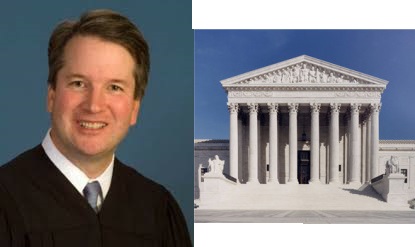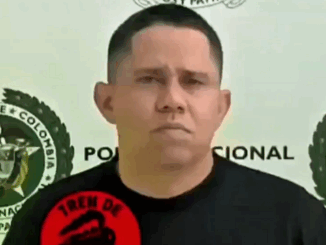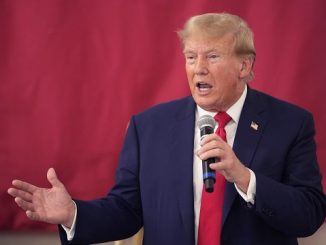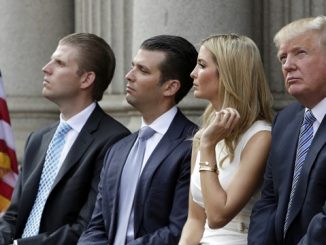
US President Donald Trump has nominated Brett Kavanaugh for the Supreme Court, setting the stage for a bruising confirmation battle.
In a primetime announcement at the White House, Mr Trump praised his pick as a “brilliant jurist”.
The nominee, a District of Columbia appeals court judge, is a former adviser to ex-President George W Bush.
The decision has far-reaching implications for America on everything from abortion to guns to immigration.
This is Mr Trump’s second Supreme Court appointment, potentially allowing him to shape the US for a generation.
The president said: “Judge Kavanaugh has impeccable credentials, unsurpassed qualifications and a proven commitment to equal justice under the law.”
The appointee would replace Justice Anthony Kennedy, 81, who announced last month that he will retire soon.
At Monday night’s announcement, Mr Kavanaugh, 53, thanked President Trump and said he had “witnessed firsthand your appreciation for the vital role of the American judiciary.”
Mr Kavanaugh has served since 2006 on the influential US Court of Appeals for the District of Columbia Circuit and was formerly a White House aide under George W Bush.
He previously worked for Kenneth Starr, the independent counsel who investigated Democratic former president Bill Clinton in the 1990s.
Where does he stand on key issues?
Abortion
Mr Kavanaugh has not expressed outright opposition to Roe v Wade, the 1973 Supreme Court ruling that legalised abortion nationwide, but he has given some indications of where he might stand.
Last year, the DC Circuit Court ruled that an undocumented immigrant teenager in detention was entitled to seek an abortion. Mr Kavanaugh objected, saying that her right to have an abortion was “based on a constitutional principle as novel as it is wrong”.
He did, however, write in his dissent to the ruling that the court must recognise Roe v Wade and another abortion rights case “as precedents we must follow”.
Executive power
Mr Kavanaugh argued in 2009 article that presidents should be shielded from criminal investigations and civil lawsuits while in office. That could be a red flag to Democrats – indicating that if the special counsel investigation into Mr Trump’s campaign ties to Russia finds its way to the Supreme Court, he would not support action against Mr Trump while the president before his term is up.
Guns
He is pro-second amendment. In 2011, he objected when the DC Circuit Court upheld a ban on most semi-automatic rifles in the district. He argued that, because most handguns are semi-automatic, and are protected by a previous Supreme Court ruling, semi-automatic rifles should benefit from the same protection.
The environment
The nomination is likely to concern environmentalists. Mr Kavanaugh has issued rulings and dissents against Obama-era environmental regulations, including efforts to curb air pollution from power plants and greenhouse gases.
What’s at stake?
The US Supreme Court is the ultimate arbiter on contentious laws and disputes between states and the federal government.
It rules on such issues as abortion, the death penalty, voter rights, immigration policy, campaign finance and racial bias in policing.
Each of the nine justices holds a lifetime appointment. As Mr Kavanaugh is relatively young, he could serve for decades to come.
His appointment will not change the ideological tilt of a court that already has a 5-4 conservative majority, but he could shift the bench further to the right.
Justice Kennedy sometimes sided with the court’s liberal members. But Mr Kavanaugh may not be so accommodating.
Neil Gorsuch, 50, who was appointed by Mr Trump last year, is already one of the court’s most conservative justices.
What next?
The nominee must be confirmed by the Senate, which the Republicans narrowly control 51-49.
A nominee needs a simple majority of 51 votes to be confirmed. With Senator John McCain battling cancer, Republicans can currently only muster 50 votes.
Before a full vote in the chamber, the prospective justice will be grilled by the Senate Judiciary Committee in hearings that can go on for days.
The White House and Republicans want the nomination confirmed by November’s mid-term elections.
Conservative activists will begin running ads pressuring politically vulnerable Democratic senators to vote for confirmation.
Joe Donnelly of Indiana, Heidi Heitkamp of North Dakota and Joe Manchin of West Virginia will be prime targets, as they face tough re-election campaigns in their conservative states this year.
Meanwhile, liberal groups are calling on two moderate Republican senators – Susan Collins of Maine and Lisa Murkowski of Alaska – to reject the nominee.
Ms Collins has said she will not vote for any candidate who threatens abortion rights.
A safe pair of hands
Analysis by Anthony Zurcher, BBC News, Washington
The front-runner was a front-runner for a reason.
Over the weekend, it looked as though Judge Kavanaugh’s star may have been fading, that perhaps he had too-close ties to the Bush family for Mr Trump’s liking. In the end, however, the safe pick won out.
He is the kind of judge a President Jeb Bush or Mitt Romney would have picked – a man with an established legal pedigree and a reputation as a reliably conservative jurist.
If the party sticks together, the president’s choice will be sitting on the Supreme Court when its new term starts in October.
President Trump campaigned with a promise to conservatives that he would fill the federal courts, from the top on down, with judges to their liking.
It’s a promise that has helped cement near-record levels of support for his presidency from Republican voters – and for good reason.
Mr Trump is securing a conservative judiciary for a generation.
Source: bbc.co.uk






Be the first to comment